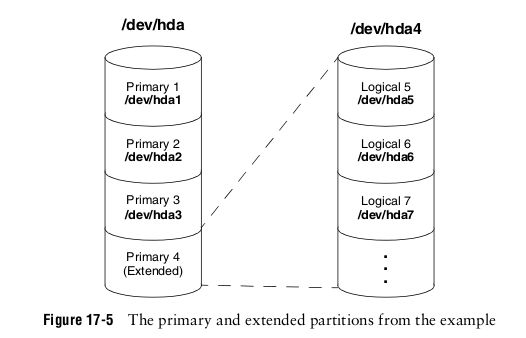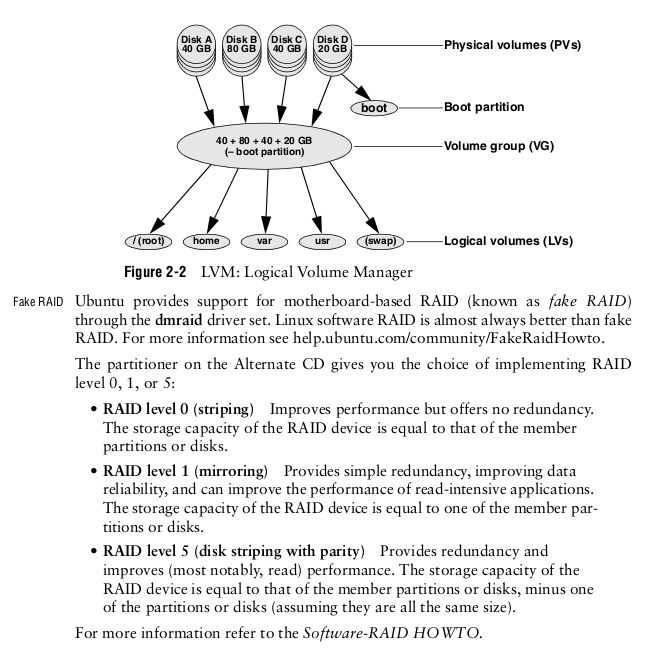FHS
/boot This partition holds the kernel and other data the system needs when it boots. Many administrators put an ext2 filesystem on this partition because the data on it does not change frequently enough to justify the added overhead of the ext3 journal.
/var The name var is short for variable: The data in this partition changes frequently.
Because it holds the bulk of system logs, package information, and accounting data,making /var a separate partition is a good idea. In this way, if a user runs a job that consumes all of the user’s disk space, system logs will not be affected. The /var partition can occupy from 500 megabytes up to several gigabytes for extremely active systems with many verbose daemons and a lot of printer activity (files in the print queue are stored on /var). Systems that are license servers for licensed software often qualify as extremely active systems. By default, Apache content (Web pages it serves) is stored on /var under Ubuntu.
/home It is a common strategy to put user home directories on their own disk or partition.
This partition is usually named /home. Having /home in a separate partitionallows you to perform a clean install without overwriting user files.
Set up partitions to aid in making backups
/(root) /lib, which can consumemore than 300 megabytes, is part of the root partition. On occasion, you may
install a special program that has many kernel drivers (在/下?) that consume a lot of space in the root partition. Allot 1 gigabyte to the root partition at a minimum.
/usr Separating the /usr partition can be useful if you plan to export /usr to another system and want the security that a separate partition can give.usr是 Unix Software Resource的縮寫, 也就是『Unix作業系統軟體資源』Many administrators put an ext2 filesystem on this partition because the data on it does not change frequently enough to justify the added overhead of the ext3 journal(ext3 日志开销较大). The size of /usr depends on
the number of packages you install. On a default system, it is typically 2–4 gigabytes.
/usr/local Both /usr/local and /opt are candidates for separation. If you plan to install many and /opt packages in addition to Ubuntu Linux, you may want to keep them on a separate partition. If you install the additional software in the same partition as the users’ home directories, for example, it may encroach on users’ disk space. Many sites keep all /usr/local or /opt software on one server and export it to other systems. If you choose to create a /usr/local or /opt partition, its size should be appropriate to the software you plan to install.
/opt 第三方软件
/usr 系统发行版自带的软件
| 系统管理员在本机自行安装自己下载的软件(非distribution默认提供者),建议安装到此目录, 这样会比较便于管理。举例来说,你的distribution提供的软件较旧,你想安装较新的软件但又不想移除旧版, 此时你可以将新版软件安装于/usr/local/目录下,可与原先的旧版软件有分别啦! 你可以自行到/usr/local去看看,该目录下也是具有bin, etc, include, lib...的次目录喔! |
The Logical Volume Manager (LVM2, which this book refers to as LVM) allows you to change the size of logical volumes (LVs, the LVM equivalent of partitions) on the fly. With LVM, if you make a mistake in setting up LVs or your needs change,you can make LVs smaller or larger without affecting user data. You must choose to use LVM at the time you install the system or add a hard disk; you cannot retroactively apply it to a disk full of data.
RAID (Redundant Array of Inexpensive/Independent Disks) employs two or more hard disk drives or partitions in combination to improve fault tolerance and/or performance.RAID, which can be implemented in hardware or software (Ubuntu gives you this option,内核也提供了相应的软件机制,内核叫fake-raid), spreads data across multiple disks.
Do not use RAID as a replacement for regular backups. If the system undergoesa catastrophic failure,RAID is useless. Earthquake, fire, theft, and other disasters may leave the entire system inaccessible (if the hard disks are destroyed or missing).RAID also does not take care of the simple case of replac-
ing a file when a user deletes it by accident.
The Linux kernel automatically detects RAID arrays (sets of partitions) at boot time if the partition ID is set to 0xfd (raid autodetect).
$ grep desktop-i386 MD5SUMS.htm;md5sum gutsy-desktop-i386.iso //校验方法
198fc031e7e482514eb57a2a7890dcac *gutsy-desktop-i386.iso
198fc031e7e482514eb57a2a7890dcac gutsy-desktop-i386.iso


